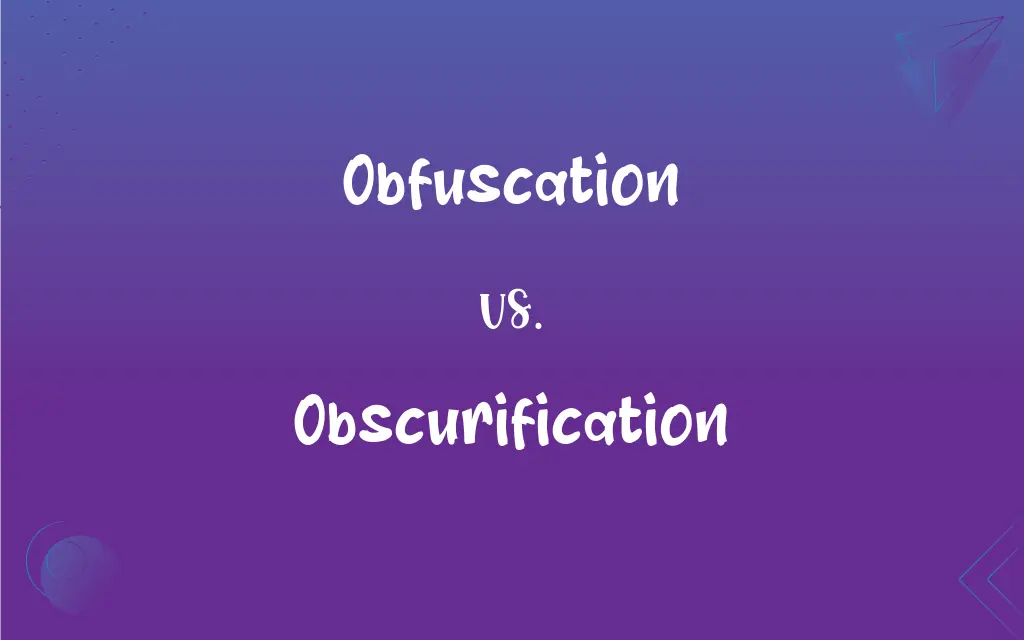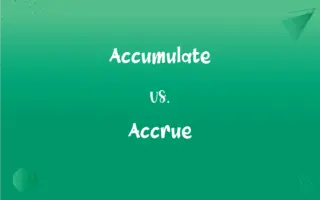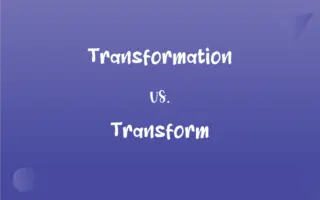Obfuscation vs. Obscurification: What's the Difference?
By Aimie Carlson & Harlon Moss || Updated on February 20, 2024
Obfuscation deliberately complicates information to make it hard to understand, while obscurification involves making something less visible or clear, often subtly.

Key Differences
Obfuscation is a strategy used to make information or code difficult to interpret, often for security purposes. It's like using a complex code to hide the true meaning. Conversely, obscurification is about dimming or making something less obvious, not necessarily to conceal but to blur the details.
Obfuscation is commonly applied in computer science, where code is intentionally made complex to protect intellectual property or enhance security. For example, software developers obfuscate code to prevent unauthorized access or understanding. Obscurification, however, might be employed in photography or art to slightly hide or blur certain elements, enhancing aesthetic appeal or focus.
Obfuscation aims at confusion and making understanding or interpretation deliberately challenging, obscurification can be a natural process or a less intense effort to make something less noticeable or clear. Obscurification might result from fog over a landscape, subtly changing the scene's visibility.
The intent behind obfuscation is crucial; it's about protection, privacy, or security. This deliberate action seeks to complicate understanding for a specific purpose. Obscurification, on the other hand, may not always have a direct intention behind it and can occur as a byproduct of other actions or natural conditions.
In terms of effectiveness, obfuscation is a technical and deliberate process that requires skill and knowledge to implement effectively. It's a calculated measure in cybersecurity, for instance. Obscurification might not require as much technical skill and can be achieved through simpler methods, such as adjusting light in photography.
ADVERTISEMENT
Comparison Chart
Definition
Deliberate act of making something difficult to understand
Making something less visible or clear, often subtly
Primary Use
In technology, to secure code or data
In visual arts, photography, or as a natural process
Intent
To protect, secure, or hide information from unauthorized understanding
To diminish clarity or visibility, not necessarily with a protective intent
Skill Required
High, involves complex techniques
Variable, can be natural or involve simple techniques
Outcome
Makes interpretation or unauthorized access challenging
Reduces visibility or clarity, may not completely hide
ADVERTISEMENT
Obfuscation and Obscurification Definitions
Obfuscation
Making something intentionally unclear to add mystery or intrigue.
The artist's statement was an obfuscation of his true intentions.
Obscurification
A natural phenomenon that reduces visibility.
The fog served as an obscurification, enveloping the city.
Obfuscation
Making code intentionally complex to prevent unauthorized understanding.
Developers use obfuscation techniques to secure their software.
Obscurification
The process of making something less visible or clear.
The mist was an obscurification of the mountain's peak.
Obfuscation
A strategy in cybersecurity to protect data from hackers.
Obfuscation is essential in safeguarding sensitive information.
Obscurification
The act of dimming lights to create ambiance.
The restaurant's obscurification of lighting set a romantic mood.
Obfuscation
The act of clouding the true meaning of communication to protect privacy.
The witness's testimony was filled with obfuscation.
Obscurification
Applying a filter or effect to reduce clarity in photography.
Her use of obscurification added an ethereal quality to the photos.
Obfuscation
Employing confusing language or details to hide the truth.
The contract was full of legal obfuscations.
Obscurification
Making details harder to perceive, often for aesthetic purposes.
The painter's use of obscurification blurred the lines between reality and imagination.
Obscurification
The act of making something obscure, or (in computing) obfuscating source code etc.
FAQs
Can obfuscation be reversed?
With enough skill and effort, yes, but it's designed to be difficult to undo.
What is the main goal of obfuscation?
To deliberately make information or code difficult to interpret for security or privacy reasons.
Is obfuscation ethical?
It can be, especially when used to protect sensitive information or intellectual property.
How does obscurification affect visual art?
It can add depth, mystery, or focus by making certain elements less clear or visible.
How does obscurification differ in photography?
It's used to creatively alter visibility or clarity, affecting the mood or focus of the image.
Can obscurification be used for security purposes?
While it can make details less clear, it's not primarily intended for security like obfuscation is.
Is obscurification always intentional?
No, it can occur naturally or as a byproduct of other actions.
Can obfuscation be harmful?
If misused, it can obscure important information, leading to confusion or misunderstanding.
Is obscurification effective in obscuring details?
It can be, depending on the method and intent, but it's generally subtler than obfuscation.
What industries commonly use obfuscation?
Technology, cybersecurity, and software development.
What skills are necessary for effective obfuscation?
Technical knowledge and understanding of the information or system being obfuscated.
How do artists use obscurification?
To enhance aesthetic appeal, focus, or convey a specific atmosphere.
Is there a crossover between obfuscation and obscurification?
While their goals can overlap, their methods and intents are distinct.
How do natural conditions contribute to obscurification?
By altering visibility or clarity, such as weather conditions obscuring landscapes.
Can obfuscation be used in everyday communication?
Yes, through the use of complex or ambiguous language to hide true meanings.
What is a key difference in outcome between the two?
Obfuscation aims for confusion and difficulty in interpretation, while obscurification aims for reduced visibility or clarity.
Can obscurification be planned or accidental?
It can be either, depending on the context and desired outcome.
Can obscurification be a natural process?
Yes, such as fog or mist reducing visibility.
What is the difference in intent between obfuscation and obscurification?
Obfuscation is protective or secretive, while obscurification may not have a protective intent.
What is a common misconception about obfuscation?
That it's solely for illicit purposes; it's often used ethically for protection.
About Author
Written by
Aimie CarlsonAimie Carlson, holding a master's degree in English literature, is a fervent English language enthusiast. She lends her writing talents to Difference Wiki, a prominent website that specializes in comparisons, offering readers insightful analyses that both captivate and inform.
Co-written by
Harlon MossHarlon is a seasoned quality moderator and accomplished content writer for Difference Wiki. An alumnus of the prestigious University of California, he earned his degree in Computer Science. Leveraging his academic background, Harlon brings a meticulous and informed perspective to his work, ensuring content accuracy and excellence.































































